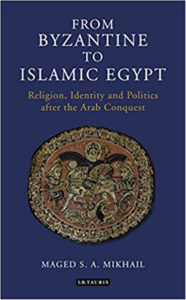
From Byzantine to Islamic Egypt: Religion, Identity and Politics After the Arab Conquest
Maged S. A. Mikhail
IB Tauris (2016)
Rs2,886
The conquest of Egypt by Islamic armies under the command of Amr ibn al-As in the seventh century transformed medieval Egyptian society. Seeking to uncover the broader cultural changes of the period by drawing on a wide array of literary and documentary sources, Maged Mikhail stresses the cultural and institutional developments that punctuated the histories of Christians and Muslims in the province under early Islamic rule.
From Byzantine to Islamic Egypt traces how the largely agrarian Egyptian society responded to the influx of Arabic and Islam, the means by which the Coptic Church constructed its sectarian identity, the Islamisation of the administrative classes and how these factors converged to create a new medieval society. The result is a fascinating and essential study for scholars of Byzantine and early Islamic Egypt.
Maged S. A. Mikhail obtained a PhD in the History of the Near and Middle East from the University of California, Los Angeles for which he received an Honourable Mention for the Malcolm H. Kerr Dissertation Award from the Middle East Studies Association of North America. He currently teaches at California State University, Fullerton.
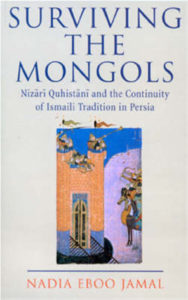
Surviving the Mongols: Nizari Quhistani and the Continuity of Ismaili Tradition in Persia
Nadia Eboo Jamal
IB Tauris (2003)
Rs2,199
During the 13th century, the Persian-speaking lands were devastated by a series of Mongol invasions resulting in the death and displacement of countless Muslims of the region. Contrary to beliefs, a small number of Ismailis survived the Mongol onslaught, together with the basic infrastructure of their religious organization, the “da’wa”. Here, the author explores, by examining the 13th-century writings of the poet Nizari Quhistani, how the Persian Ismailis maintained their religious identity and community.
Nadia Eboo Jamal received her doctorate in Near Eastern Languages and Literature from New York University, and is a specialist in Iranian history and culture in the period of Mongol rule.
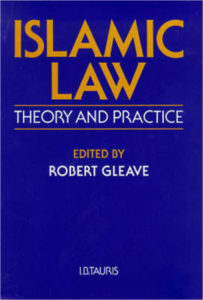
Islamic Law: Theory and Practice
Edited by: Robert Gleave, Eugenia Kermeli
IB Tauris (2001)
Rs8,493
This text deals with the theory and practice of Islamic law in both the formative classic and modern periods and over a range of societies. It is divided into four sections dealing with: legal theory; fatwas and muftis in classical Islamic law; the position of religious minorities under Islamic law, and modern developments in Islamic law. In addition to exploring the tension between theory and practice, the book focuses on the role of ijtihad in both Sunni and Shi’i fiqh and in collections of fatwa, and looks at the relationship between judicial practice and positive law.
Rob Gleave is Professor of Arabic Studies and Director of the Centre for the Study of Islam (CSI), IAIS, University of Exeter. The CSI organises regular seminars and workshops, bringing together staff, researchers and students studying topics related to Islam to share research. His research interests include Islamic legal theory, particularly legal hermeneutics, and the history of Shi’ite legal thought and institutions.
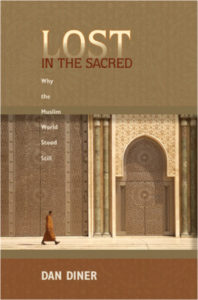
Lost in the Sacred: Why the Muslim World Stood Still
Dan Diner & Translated by Steven Rendall
Princeton Uni Press (2009)
Rs707
Lost in the Sacred poses questions about the Muslim world that no other book by a Western writer has dared to ask. Focusing on the Arab Middle East, Dan Diner asks what caused the Muslim world to lag behind so dramatically. Is Western dominance to blame? Or is the problem even with Islam itself? These questions, however unsettling, need to be asked—and they are being posed all across the Muslim world today. This book provides cautious answers that are no less disturbing than the questions.
Diner argues that Islam’s cultural stasis is not due to the Muslim faith itself, but to the nature of the sacred it is infused with and that penetrates every aspect of life—spiritual and material. He reveals how the sacred in Islam suspends the acceleration of social time, hinders change, and circumvents secularization and modernity. Diner takes readers on an unforgettable intellectual journey, from today’s global conflicts back into the distant past. He describes the Muslim encounter with the emerging West in early modernity, the challenges Western imperial expansion posed in the nineteenth and twentieth centuries, the time-suspending impact of Arabic as a sacred language, the prevention of print, the classical age of Islam with its dazzling heights of learning and culture—and much more. Diner traces an entangled perspective, combining the spiritual with the social, and the cultural with the political. Throughout, he draws our attention to the urgent need for secularization and modernization in Islam.
The Muslim world is in crisis. Lost in the Sacred explains why.
“All the evidence—yes, all—points to the ossification of Muslim thought and Muslim behavior in the world. . . . [Lost in the Sacred: Why the Muslim World Stood Still] makes the point clearly and convincingly.”—Martin Peretz, New Republic
“[Diner] analyzes how the Middle East, which led in cultural, mathematical, and scientific innovation during Europe’s Dark Ages, lost momentum. . . . A deep and thorough analysis of the causes of the problems identified by the Arab Human Development Report that will be of interest to followers of Middle Eastern history and politics and those looking to understand the differences with the West.”—Deirdre Sinnott, ForeWord Magazine
Dan Diner is professor of modern history at the Hebrew University of Jerusalem and director of the Simon Dubnow Institute for Jewish History and Culture at the University of Leipzig. His books include Beyond the Conceivable: Studies on Germany, Nazism, and the Holocaust and Cataclysms: A History of the Twentieth Century from Europe’s Edge.
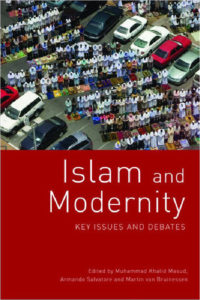
Islam and Modernity: Key Issues and Debates
Edited by Muhammad Khalid Masud, Armando Salvatore, Martin van Bruinessen
Edinburgh Uni Press (2009)
Rs3,395
Recent events have focused attention on the perceived differences and tensions between the Muslim world and the modern West. As a major strand of Western public discourse has it, Islam appears resistant to internal development and remains inherently pre-modern. However Muslim societies have experienced most of the same structural changes that have impacted upon all societies: massive urbanisation, mass education, dramatically increased communication, the emergence of new types of institutions and associations, some measure of political mobilisation, and major transformations of the economy. These developments are accompanied by a wide range of social movements and by complex and varied religious and ideological debates.
This textbook is a pioneering study providing an introduction to and overview of the debates and questions that have emerged regarding Islam and modernity. Key issues are selected to give readers an understanding of the complexity of the phenomenon from a variety of disciplinary perspectives. The various manifestations of modernity in Muslim life discussed include social change and the transformation of political and religious institutions, gender politics, changing legal regimes, devotional practices and forms of religious association, shifts in religious authority, and modern developments in Muslim religious thought.
Each chapter contains an overview of relevant secondary literature and concludes with a summary of the key ideas presented and a set of questions
Contributing authors include some of the best-known academics from various disciplines in the field presenting state of the art scholarship in their specialised areas
Muhammad Khalid Masud is Chairman of the Council of Islamic Ideology in Islamabad. His recent publications include the edited volumes Travellers in Faith, Studies on Tablighi Jama’at (2000), and Leading Muslim Intellectuals of Eighteenth Century India (in Urdu, 2008).
Armando Salvatore is Associate Professor of Sociology of Culture and Communication at the Oriental Studies University, Naples. Among his most recent books are The Public Sphere: Liberal Modernity, Catholicism, Islam (2007), and Public Islam and the Common Good (co-edited with Dale F. Eickelman, 2004).
Martin van Bruinessen is Professor of the Comparative Study of Contemporary Muslim Societies at Utrecht University. His publications include Kurdish Ethno-Nationalism versus Nation-Building States (2000), and Sufism and the ‘Modern’ in Islam (co-edited with Julia D. Howell, 2007).

